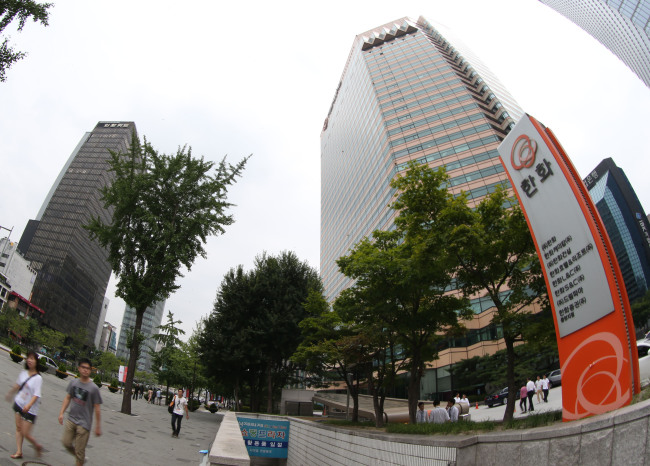Imprisonment of Hanwha chairman draws mixed response from business, political circles
Business circles seem to be perplexed by the imprisonment of Hanwha Group chairman Kim Seung-youn, who was sentenced to a four-year prison term and a 5.1 billion won ($4.5 million) fine for embezzlement and breach of trust on Thursday.
In many economic crime cases involving business tycoons, the Korean judiciary has shown leniency toward them, citing their contribution to the national economy. Even when convicted, most of them have been pardoned by the president.
For Kim, who has been indicted five times over his 31-year tenure at the nation’s 10th largest conglomerate, it was the first time on Thursday he was imprisoned right after the court handed down the verdict.
The harsher-than-expected sentence on the Hanwha chairman, however, is signaling that the nation’s powerful chaebol could be facing heightened pressure amid a recent demand for “economic democratization” for balanced growth.
Business circles seem to be perplexed by the imprisonment of Hanwha Group chairman Kim Seung-youn, who was sentenced to a four-year prison term and a 5.1 billion won ($4.5 million) fine for embezzlement and breach of trust on Thursday.
In many economic crime cases involving business tycoons, the Korean judiciary has shown leniency toward them, citing their contribution to the national economy. Even when convicted, most of them have been pardoned by the president.
For Kim, who has been indicted five times over his 31-year tenure at the nation’s 10th largest conglomerate, it was the first time on Thursday he was imprisoned right after the court handed down the verdict.
The harsher-than-expected sentence on the Hanwha chairman, however, is signaling that the nation’s powerful chaebol could be facing heightened pressure amid a recent demand for “economic democratization” for balanced growth.

Ahead of the verdict, the 60-year-old Hanwha chief carried out diverse overseas activities including securing an $8 billion contract to build a housing complex in Iraq ― one of the nation’s largest overseas construction deals.
More recently, he visited London to praise Korean shooters supported by Hanwha. They put on their best Olympics performance by winning three gold and two silver medals during this year’s summer event.
But unlike previous cases, those activities seemed to have failed to be taken into consideration for the court’s ruling.
“Chairman Kim incurred losses to the company by using his power and the status of his family. But he has not shown remorse for his crime,” judge Seo Gyung-hwan of the Seoul Western District Court said in a ruling.
“Documents of Hanwha Group presented by the prosecution show that Kim holds enormous power in making decisions. Kim is almost considered a god inside the group.”
Earlier in July, prosecutors demanded nine years of imprisonment and 150 billion won in fines for Kim, for illegally using company funds to pay back the debts of firms he secretly ran between 2004 and 2006.
Hanwha officials said Kim will immediately appeal to a higher court, while business groups dismissed the ruling as based on politicians’ populism aimed at wooing voters ahead of the December presidential election.
The Federation of Korean Industries, a business lobby group, expressed regret over Kim’s sentence, saying in a statement, “At a time of economic difficulties, it is regrettable that a business leader is imprisoned.”
“The imprisonment of a chaebol chairman could have great influence in the group’s whole management. Some problems are unavoidable in important decision making, which could lead to a negative impact in investment,” said an industry official, declining to be identified.
Despite resistance from businesses, the social atmosphere is expected to become harsher against owners of family-run conglomerates. The judiciary has already tightened sentencing guidelines against crimes committed by them in 2009.
And the landmark ruling on Kim could affect a lot of other pending rulings on business tycoons here, with group officials keeping a low profile.
Chey Tae-won, chairman of SK Group, the nation’s third-largest conglomerate, is on trial for misappropriating nearly 1 billion won from SK affiliates to cover losses from his personal stock investment.
Park Chan-koo, chairman of Kumho Petrochemical, is waiting for a verdict on charges of embezzlement and illegal use of insider information, while Sun Jong-koo, former chairman of electronics retail giant Himart, is also on trial for tax evasion and breach of trust.
On Friday, lawmakers and key presidential candidates, regardless of their political parties, urged strict punishment for business leaders involved in irregularities, denying the judiciary’s indulgence.
Considering the current social atmosphere, coupled with the presidential election in December, industry watchers predict that if the higher court confirms the sentence on Kim, it is unlikely he will be pardoned in the new government to be inaugurated in February next year.
By Lee Ji-yoon (jylee@heraldcorp.com)
-
Articles by Korea Herald




![[Herald Interview] 'Amid aging population, Korea to invite more young professionals from overseas'](http://res.heraldm.com/phpwas/restmb_idxmake.php?idx=644&simg=/content/image/2024/04/24/20240424050844_0.jpg&u=20240424200058)












![[KH Explains] Korean shipbuilding stocks rally: Real growth or bubble?](http://res.heraldm.com/phpwas/restmb_idxmake.php?idx=652&simg=/content/image/2024/04/25/20240425050656_0.jpg&u=)

